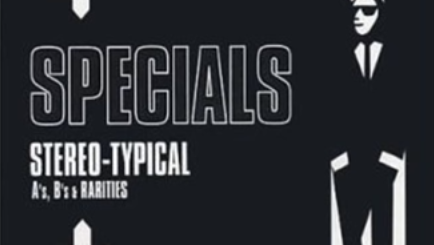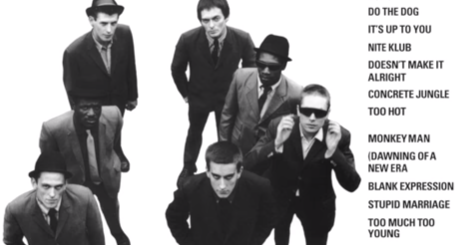Ghost Town by The Specials Lyrics Meaning – Exploring the Roots of Urban Desolation in Song
Lyrics
All the clubs have been closed down
This place is coming like a ghost town
Bands won’t play no more
Too much fighting on the dance floor
Do you remember the good old days before the ghost town?
We danced and sang and the music played in natty-boom town
This town is coming like a ghost town
Why must the youth fight against itself?
Government leaving the youth on the shelf
This place is coming like a ghost town
No job to be found in this country
Can’t go on no more
The people getting angry
This town is coming like a ghost town
This town is coming like a ghost town
This town is coming like a ghost town
This town is coming like a ghost town
This town is coming like a ghost town
This town is coming like a ghost town
This town is coming like a ghost town
This town is coming like a ghost town
Skanking beneath the crumbling facades of 1981 Britain, The Specials’ ‘Ghost Town’ reverberates with a grim portrait of urban decay. More than just a catchy ska rhythm and haunting melody, the track is an aural monument to the socioeconomic and political turbulence of the time. To dissect ‘Ghost Town’ is to unearth the societal dread of a generation feeling abandoned by the powers that be.
Behind its eerie atmosphere and ghostly echo of a once vibrant scene, ‘Ghost Town’ encapsulates the desolation and despair creeping into British towns amid economic downturns, rising unemployment, and civil unrest. It’s a vivid snapshot, rendered in sepia tones of memory and loss, of the zeitgeist of an era on the brink of change, clinging to the last strands of community and culture.
Dance Floor Battles: More Than a Metaphor
In the lament ‘Too much fighting on the dance floor,’ The Specials weren’t just talking about literal skirmishes beneath the disco ball. This line encapsulates the bubbling tensions within the youth, manifesting in clashes not just of bodies, but of ideals. The dance floor was once a sacred space of unity and expression. Here, it becomes a symbol of division, illustrating the fracturing of a generation’s dreams and the violent impact of societal pressures.
The duality of this lyric speaks to the listener, pulling them into the fray, asking them to recall the ‘good old days’ and to witness the disintegration of communal joy. The dance floor, once an escape, now reflects the chaos that laid siege to the streets outside, a mirror to a world where the music has stopped and the lights have gone dim.
Haunting Relevance: ‘Ghost Town’s’ Modern Echo
While penned in the early ’80s, ‘Ghost Town’ continues to resound in modern times. Economic crises, social upheaval, and strained communities give the song a timeless quality that resonates with those living through similar struggles today. It’s as if The Specials, through the medium of their politically charged ska, created an anthem for the disenfranchised, a tune that cuts across decades to speak to the despondent.
In a world where cities continue to grapple with violence, poverty, and political abandonment, ‘Ghost Town’ serves as a sober reminder of the cyclical nature of these societal woes. It’s a kind of comforting specter, whispering to new generations that their battles are shared by the past, even as the specifics of the struggle shift and evolve.
The Political Cry Amidst the Silence
‘Government leaving the youth on the shelf’ is not just a line, it’s a rallying cry, a searing indictment of the political failure to protect and invest in the future generation. The song doesn’t whisper its grievances; it shouts them, embedding a powerful political message within the anguish of its melody.
The Specials captured the sentiment of youth whose potential was being squandered, whose very vitality was being ignored. This lyric serves to galvanize, to remind those who feel overlooked that their voice has power, even when it seems drowned out by the suffocating silence of neglect.
Uncovering the Hidden Message of ‘Ghost Town’
Beneath its ghostly veneer, ‘Ghost Town’ carries a hidden meaning, one of dissent against the commodification of culture. The repeated lament over closed clubs and silent bands suggests a resistance to how economic and political turmoil strips the soul from cultural spaces, turning them into hollowed ruins.
The song subtly conveys the importance of these social hubs for identity and connection, hinting at how their erasure serves to perpetuate the very isolation that haunts the nation. It is, at heart, a defense of the arts as a communal necessity, a bastion against the encroaching ghost town mentality.
Memorable Lines that Echo Through the Decades
‘This town is coming like a ghost town,’ the song’s prophetic refrain, cements itself in the cultural consciousness as a dire warning. These words are an epitaph for the disintegration of community life and a haunting omen of a world left barren by its own neglect.
Reiterated with the weight of inevitability, this line binds the song’s themes together, wrapping its foreboding message in a rhythm that compels us to take notice. It’s a line that has endured, reminding all who hear it that the desolation of ‘Ghost Town’ is an ongoing narrative, a story that continues to unfold in cities across the world.








